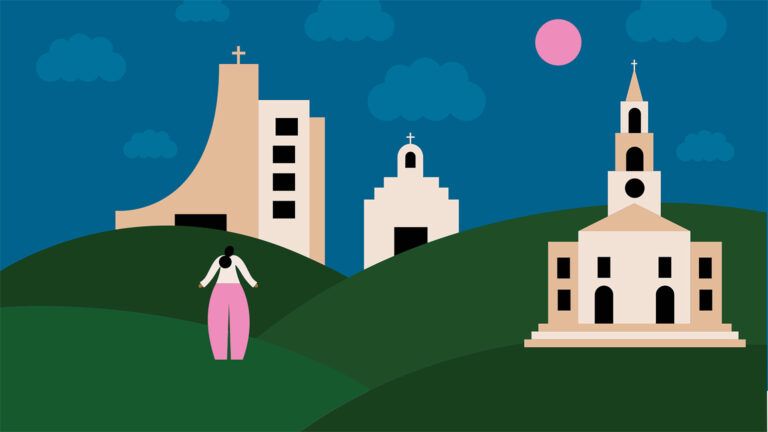I wrote last week about Leymah Gbowee, the Liberian peace activist who rallied women in her country to help end a brutal 14-year civil war. Yesterday I met Leymah here in New York. Officially we sat down to talk about her story, which is scheduled for the July issue of GUIDEPOSTS.
Privately, though, I came with another, deeper, maybe unanswerable question. I wanted to know what exactly had enabled someone, especially someone with virtually no social power or capital, to stare down the powerful people she had stared down when she demanded, and then forced, her country to change. There must be a quality beyond courage, I thought, beyond even driving anger, that enabled such daring. Maybe it was faith. Maybe it was something with no name.
Here’s what I saw, though, when Leymah walked into the offices of the non-profit foundation where we met. (The foundation is run by Leymah’s friend Abigail Disney, who produced the film about Liberia, Pray the Devil Back to Hell. Leymah picked it, I suppose, because she’d been there before and knew she could find it.) I saw a woman several months pregnant in a colorfully patterned shirt, black pants, black vinyl sandals, who was tired, who moved slowly, as if she yearned for sleep but couldn’t sleep because she had to answer my questions. I saw a woman like the countless women I see every day on the streets of New York. That is, I saw ordinariness.
Now, don’t get me wrong. There is nothing ordinary about Leymah—in one sense, at least. She is bitingly smart and articulate, with a wry, knowing sense for people and their vanities, including her own. Once we started talking, she became completely immersed in her story, answering my questions in 10- and 15-minute bursts, telling stories within stories, painting vivid pictures of the women who came to her from Liberian villages seeking deliverance from the ravages of war.
She is also afraid of no one, and tolerates no b.s. She put me on notice that she wasn’t so enthusiastic about journalists, having talked to many who feigned great interest in her country, only to ignore most of what she told them. Still, as she talked, I realized that my search for that indescribable quality, that luminous source of inner strength and conviction, was probably going to prove fruitless.
Leymah was, above all, an ordinary person. She was late for our interview because there’d been a problem with the gas at the apartment where she was staying, and she’d had to track down someone in the building to fix it. She’d taken a cab, accompanied by her sister and a niece, and asked if I could reimburse her for the fare. I think she doesn’t have a lot of money, especially not by American standards.
As she talked, telling her sad story of displacement by war, her bewilderment and helplessness building until, almost by accident, she began gathering women to protest in a field in Monrovia, the Liberian capital, I realized there was no particular quality, not even a particular moment, that propelled Leymah into courageous activism. Her story is more prosaic than that. And, I have to say, I find that immensely comforting.
We Americans live in a society that worships celebrities of all kinds. We devour news of their every coming and going, alternately elevating them to godlike heights and, oddly, holding them close in a weird, fake intimacy. (What’s with that “Stars: They’re Just Like Us!” feature in US Magazine? Who wants stars to be just like us? I thought the whole point was, they’re not.)
What we don’t seem to want is ordinary humanity. And I admit, I had fallen prey to that impulse before meeting Leymah. I assumed that because she’d done this amazing work, because a movie had been made about her, she would come bearing some intangible quality of greatness. She does have greatness, an abundance of it. But it’s not a greatness that sets her apart as someone who does things I could never do. Her greatness came about as all greatness does, by a concatenation of events she had no control over, events that only in hindsight turn out to have been decisive.
We all go through similar events, even if no one makes a movie about us. We raise children (the supreme challenge!). If we’re lucky and selfless enough, we achieve intimacy. At the end we die and come face to face with God in some way that none of us right now can fully comprehend.
What I suppose I like most about working for GUIDEPOSTS is that, despite the fact that we too put celebrities on our cover, the magazine’s primary mission is to celebrate those ordinary milestones passed by ordinary people, and to show above all that God meets us where we are, not on some celebrity pedestal.
Leymah’s story in GUIDEPOSTS of course will seem extraordinary. But not too extraordinary, I hope. Not so extraordinary that we lose sight of the fact that what she did we all can do, each in our own small way. I like to think it is precisely that, not some overblown, movie-ready heroism, that that makes her story worth telling.
Jim Hinch is a senior editor at GUIDEPOSTS. Reach him at jhinch@guideposts.org.




